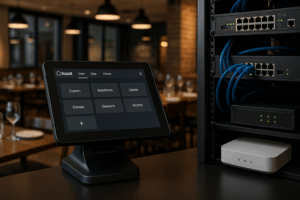Understanding Self-Managed vs. Toast Managed Networks
- Phone: +1(833)PHX-Geek
- 712 H St NE Suite 1904 Washington, D.C. 20002
Are you looking to come to Toast POS? Follow this link to sign up and get a free quote from your local Toast Rep. They will come out to your restaurant, and give you a free, no obligation quote.
Self-managed networks offer businesses the flexibility to control their own network infrastructure. In this model, companies are responsible for all aspects, including setup, maintenance, and troubleshooting. This autonomy allows businesses to customize their networks to meet specific needs, which can be advantageous for those with unique requirements or technical expertise.
However, the self-managed approach often requires a dedicated IT team to handle the complexities of network management. This can result in higher operational costs, particularly for smaller businesses that may struggle to maintain a full-time tech workforce. Additionally, the responsibility for updates and security falls entirely on the company, which can be a daunting task in today’s threat landscape. 
Ultimately, self-managed networks can provide greater control but often at the cost of time, resources, and necessary expertise. Organizations must weigh these factors carefully when considering their network management options.
Toast managed networks are designed to simplify the management process for restaurants and similar businesses. With this system, Toast provides comprehensive support, including regular updates, security management, and troubleshooting, allowing businesses to focus on their core operations without getting bogged down in technical issues.
One of the primary benefits of Toast managed networks is the integrated approach to network management. This means that businesses receive a unified solution that ties together point-of-sale systems, inventory management, and customer interaction platforms. This integration fosters efficiency and can lead to improved operational insights, helping business owners make informed decisions.
 Moreover, by outsourcing network management to Toast, restaurants can reduce the burden of hiring and training IT staff. This can translate to significant cost savings, enabling businesses to allocate resources toward enhancing customer experience and expanding their services.
Moreover, by outsourcing network management to Toast, restaurants can reduce the burden of hiring and training IT staff. This can translate to significant cost savings, enabling businesses to allocate resources toward enhancing customer experience and expanding their services.
When evaluating the cost implications of self-managed versus Toast managed networks, several factors come into play. Self-managed networks may appear less expensive upfront, as they do not involve ongoing subscription fees. However, the hidden costs associated with hiring IT professionals, software updates, and potential downtime can quickly add up, making this option more expensive in the long run.
In contrast, Toast managed networks operate on a subscription-based model, where businesses pay a fixed monthly fee. This predictable cost structure allows for better budgeting and financial planning. Additionally, the support provided by Toast can mitigate unexpected expenses related to system failures or security breaches.
Ultimately, the choice between self-managed and Toast managed networks should involve a thorough analysis of both immediate and long-term costs, along with the specific operational needs of the business.
Selecting the right network management option is crucial for any organization. Factors such as the size of the business, technical expertise, and operational priorities should all influence this decision. For businesses with the capability to manage their own networks, a self-managed option may provide the desired control. Yet, for many, the ease and efficiency of a Toast managed network can outweigh the benefits of going it alone.

It’s essential to consider the future growth of the business as well. If expansion is on the horizon, a managed network solution like Toast can scale easily, accommodating new technology and additional locations without the hassle of transitioning systems.
Ultimately, businesses should conduct an assessment of their goals, resources, and long-term strategies before making a network management choice. By aligning these factors with the right network model, organizations can set themselves up for success.